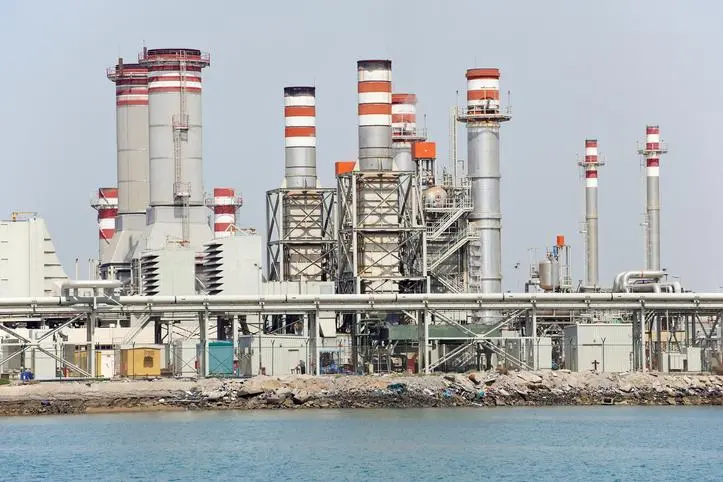PHOTO
ABU DHABI - Abu Dhabi Department of Energy, DoE, has revealed that in 2019, 1,211 Million Cubic Metres, MCM, of water was produced by Abu Dhabi’s nine Independent water and power producers, IWPPs, to support Abu Dhabi’s water demands.
The figure averages to 3.32 Million Cubic Metres Per Day, MCMD, with total available gross production capacity of 4.14 MCMD in the same year.
The announcement is based on the reports and regulatory documents that the DoE received from licensed companies operating in the water and electricity sectors in the Emirate of Abu Dhabi for a period of 12 months over 2019.
Khadija Hasan Bin Braik, Water - Pricing & Tariffs Director at DoE, said, "The water sector in Abu Dhabi enjoys a leading position at the regional and global levels through its advanced infrastructure and its application of the latest modern technologies in all stages of production, transmission and distribution, along its journey from source to end consumer. The water sector plays a major role in supporting the department's endeavors towards achieving the highest standards of sustainability, with the emirate relying heavily on desalinated water. The desalination process requires a significantly greater degree of input to enhance energy efficiency in the production of desalinated water."
Bin Braik added, "We put water quality at the top of our priorities in order to ensure the safety, security and sustainability of supply. As part of DoE’s water quality regulatory obligations and responsibilities, we oversee stringent water quality sampling and testing criteria to ensure safe and efficient drinking water supply to consumers. We are continuing to upgrade the water sector at all levels to keep pace with the increasing demand for this vital resource, both from residential users and from the economic sectors that support Abu Dhabi’s sustainable economic growth.
Highlighting the performance of Abu Dhabi’s water sector over the years, DoE revealed that the emirate’s global water peak demand growth has remained steady since 2016. In 2019, global water demand peaked at 3.72 MCMD, a negligible difference from 2018.
Water production capacity share varies between the nine IWPPs, ranging between 17 percent and 5 percent. Nearly 17 percent of the overall water production share is generated by Taweelah Asia Power Company, TAPCO, followed by Fujairah Asia Power Company, FAPCO, and Emirates SembCorp Water and Power Company, ESWPC, each holding around 14 percent of the water production market share.
DoE explained that water production is carried out using several advanced technologies, the most prevalent of which is thermal desalination accounting for 84 percent of water production in Abu Dhabi. Multi-Stage Flash, MSF, desalination dominates this method, making up two thirds (67 percent) of thermal desalination, with the remainder being Multiple Effect Distillation, MED. Seawater Reverse Osmosis, SWRO, accounts for almost 16 percent of the desalination technology mix, an increase of 5 percent from 2016.
The share of reverse osmosis, RO, will significantly grow over the coming years. The Taweelah RO Independent Water Plant, IWP, located in the Taweelah complex, will be the largest RO plant in the world and will have a production capacity of 0.91 MCMD when completed in 2022.
DoE confirmed that the Transmission and Dispatch Company, TRANSCO, is the sole water transmission licensee in Abu Dhabi, with the organisation transporting large volumes of water from production companies to distribution companies across the emirate.
In 2019, Abu Dhabi’s 3,504 km water transmission system carried a peak of 3.73 MCMD of desalinated water via mains pipelines. DoE also highlighted that Abu Dhabi’s drinking water transmission system comprises 51 pumping stations with a pumping capacity of 1,176.71 MCMD and 126 reservoirs with a total capacity of 3.02 MCM.
DoE also stated that the emirate’s distribution systems transport water from the transmission system to end users, with the total length of the system operated by Al Ain Distribution Company, AADC, and Abu Dhabi Distribution Company, ADDC, stretching to 14,204 km. DoE revealed that the total number of water customers in Abu Dhabi in 2019 reached 407,896.
Overall water quality compliance in Abu Dhabi’s water production sector for 2019 was 99.9 percent, with physical parameter and microbial parameter compliance at 99.9 percent and 100 percent, respectively. The total number of tests completed by water production companies in 2019 was recorded at 56,158, with 64 water quality parameters tested for RO and 51 water quality parameters tested for thermal desalination. The overall frequency compliance (a measurement of the number of tests conducted against those required) for the production companies was 99.5 percent.
DoE has established the Water Quality Regulations to provide wholesome drinking water to consumers throughout the Emirate of Abu Dhabi, with the regulations reflecting the current guidance of the World Health Organisation. There are nine tables (parameters and limits) transcribed in the Water Quality Regulations, with parameter tests under these conducted throughout the entire water supply chain (production, transmission and distribution).
© Copyright Emirates News Agency (WAM) 2020.





















